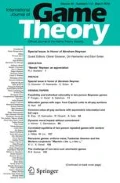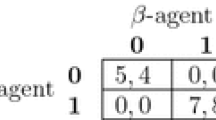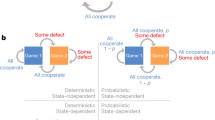Abstract
The paper presents a model of two-speed evolution in which the payoffs in the population game (or, alternatively, the individual preferences) slowly adjust to changes in the aggregate behavior of the population. The model investigates how, for a population of myopic agents with homogeneous preferences, changes in the environment caused by current aggregate behavior may affect future payoffs and hence alter future behavior. The interaction between the agents is based on a symmetric two-strategy game with positive externalities and negative feedback from aggregate behavior to payoffs, so that at every point in time the population has an incentive to coordinate, whereas over time the more popular strategy becomes less appealing. Under the best response dynamics and the logit dynamics with small noise levels the joint trajectories of preferences and behavior converge to closed orbits around the unique steady state, whereas for large noise levels the steady state of the logit dynamics becomes a sink. Under the replicator dynamics the unique steady state of the system is repelling and the trajectories are unbounded unstable spirals.









Similar content being viewed by others
Notes
See Vanderbilt (2009) which documents the steps Facebook had to take in order to keep up with the constantly increasing number of users and amount of user-produced data.
In coordination games this state coincides with the mixed strategy equilibrium. In games with a dominant strategy this point lies outside the unit interval.
While our interest is motivated by cases in which preferences evolve slower than behavior (r is close to 0), our results are qualitatively the same for all positive values of r.
I thank Matthew Johnston for discovering it.
References
Akçay E, Roughgarden J (2011) The evolution of payoff matrices: providing incentives to cooperate. Proc R Soc B 278:2198–2206
Becker G (1996) Accounting for tastes. Harvard University Press, Cambridge
Benaïm M, Weibull JW (2003) Deterministic approximation of stochastic evolution in games. Econometrica 71:873–903
Björnerstedt J, Weibull JW (1996) Nash equilibrium and evolution by imitation. In: Arrow KJ et al (eds) The rational foundations of economic behavior. St. Martin’s Press, New York, pp 155–181
Blume LE (1993) The statistical mechanics of strategic interaction. Games Econ Behavior 5:387–424
Dekel E, Ely JC, Yilankaya O (2007) Evolution of preferences. Rev Econ Stud 74:685–704
Fudenberg D, Levine DK (1998) Learning in games. Eur Econ Rev 42(3–5):631–639
Gilboa I, Matsui A (1991) Social stability and equilibrium. Econometrica 59:859–867
Güth W (1995) An evolutionary approach to explaining cooperative behavior by reciprocal incentives. Int J Game Theory 24:323–344
Güth W, Yaari ME (1992) Explaining reciprocal behavior in simple strategic games: an evolutionary approach. In: Witt U (ed) Explaining process and change: approaches to evolutionary economics. University of Michigan Press, Ann Arbor, pp 23–34
Hofbauer J, Sorger G (2002) A differential game approach to evolutionary equilibrium selection. Int Game Theory Rev 4:17–31
Johari R, Kumar S (2010) Congestible services and network effects. In: ACM conference on electronic commerce (EC)
Kojima F, Takahashi S (2007) Anti-coordination games and dynamic stability. Int Game Theory Rev 9:667–688
Matsui A (1992) Best response dynamics and socially stable strategies. J Econ Theory 57:343–362
Matsui A, Matsuyama K (1995) An approach to equilibrium selection. J Econ Theory 65:415–434
Newton J (2018) Evolutionary game theory: a renaissance. Games 9:2
Possajennikov A (2005) Two-speed evolution of strategies and preferences in symmetric games. Theor Decis 57:227–263
Rapp M (2008) Anticipating cycles. In: Working paper, UW-Madison
Sandholm WH (2001) Preference evolution, two-speed dynamics, and rapid social change. Rev Econ Dyn 4:637–639
Sandholm WH (2010) Population games and evolutionary dynamics. MIT Press, Cambridge
Schlag KH (1998) Why imitate, and if so, how? A boundedly rational approach to multi-armed bandits. J Econ Theory 78:130–156
Taylor PD, Jonker L (1978) Evolutionarily stable strategies and game dynamics. Math Biosci 40:145–156
Tilman A, Plotkin J, Akçay E (2020) Evolutionary games with environmental feedbacks. Nature Commun 11:915
Vanderbilt T (2009) Data center overload. In: The New York Times Magazine
Weitz JS, Eksin C, Paarporn K, Brown SP, Ratcliff WC (2016) An oscillating tragedy of the commons in replicator dynamics with game-environment feedback. Proc Nat Acad Sci 113(47):E7518–E7525
Acknowledgements
I thank Antonio Penta, Dan Quint, Keith Paarporn, and two anonymous referees for their comments and suggestions; Matthew Johnston and Vasily Zemchikhin for helping me with Lyapunov analysis. I am especially grateful to my advison Bill Sandholm (1970–2020) for his time, support, and encouragement during all stages of this project.
Author information
Authors and Affiliations
Corresponding author
Additional information
Publisher's Note
Springer Nature remains neutral with regard to jurisdictional claims in published maps and institutional affiliations.
Rights and permissions
About this article
Cite this article
Loginov, G. Cyclical behavior of evolutionary dynamics in coordination games with changing payoffs. Int J Game Theory 51, 1–27 (2022). https://doi.org/10.1007/s00182-021-00783-z
Accepted:
Published:
Issue Date:
DOI: https://doi.org/10.1007/s00182-021-00783-z




